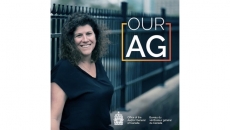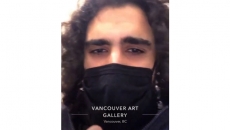New federal modelling data shows severity indicators and daily cases of COVID-19 are back on the rise as variants of the virus continue to spread in parts of the country, with incidents highest among young adults.
Those increases are coming at a bad time, says Canada's chief public health officer, who expressed concern Friday with religious holidays nearing and people wanting to gather with families.
Dr. Theresa Tam says daily cases have increased more than 30 per cent over the past two weeks, with an average of 29 deaths reported daily.
Tam says that indicates we're in a "very tight race" between vaccines and variants of concern, which make up an increasingly high proportion of new cases in several provinces.
#COVID19 key concerns in #Canada: >30% ↑ in avg. daily case counts (over last 2 weeks); ↑ severity trends, & rising #VariantsOfConcern cases (~60% ↑ over last week) is a caution we are in a very tight race between #VaccinesVsVariants https://t.co/BVRN2EYc5f
— Dr. Theresa Tam (@CPHO_Canada) March 26, 2021
#VariantsOfConcern cases are ~%60 higher than last week, accounting for an est. 5-60% of cases in impacted provinces. With Vaccines ↑ we’re closer than ever, but it’s still too soon to ease measures or gather with #COVID19 circulating.https://t.co/w27G7rHASE
— Dr. Theresa Tam (@CPHO_Canada) March 26, 2021
Approaching spring holidays may make spread tougher to contain, Tam says, noting that the country saw a sharp rise in cases following Christmas.
The Jewish holiday of Passover is this weekend while Easter follows a week later. Ramadan, the Muslim holy month of fasting, begins April 13.
"Every time we hit a holiday period, we're always a bit anxious," Tam said in a press conference. "Passover, Easter, Ramadan, (these are) times when families and churches and other gatherings typically occur.
"We want to make sure this does not happen right now. (It's) not the time."
The data released Friday by the Public Health Agency of Canada shows that while the number of cases have declined in Canadians aged 80 and older, incidence rates are highest among young adults aged 20 to 39.
Tam says infections among younger, more mobile and social age groups pose an ongoing risk for spread into high-risk populations.
Some of the decrease in incidence rates among older Canadians is a result of vaccine efforts, Tam said.
She said there's no reason the effectiveness of vaccines seen among seniors won't translate to younger groups, adding that an escalation of Canada's rollout to include as many people as possible with at least one dose could slow the pace of variant spread.
Canada administered more than 190,000 vaccines on Thursday, the most since the rollout began in mid-December, and 11 per cent of the country's adult population has now received at least one dose.
Procurement minister Anita Anand said Friday that Canada was seeing a surge in deliveries that's expected to continue, despite recent export restrictions from the European Union.
Anand says six million more doses of COVID vaccines are scheduled to flow into Canada over the next three weeks, matching the six million doses that have arrived in the country since the approval of the first vaccine.
"We are closely monitoring the global environment, including export restrictions in a number of jurisdictions," Anand said. "Our officials across numerous departments as well as our suppliers are working ahead of time to ensure that Canada's vaccines continue to arrive in our country."
LIVE: Federal ministers provide update on COVID-19 response https://t.co/5y328Iyr8a
— Health Canada and PHAC (@GovCanHealth) March 26, 2021
The influx in vaccines comes as variants continue to spread across the country.
Tam said more than 7,100 cases of variants of concern have been reported across Canada, with B.1.1.7., first identified in the U.K., making up 90 per cent of those cases. She adds that there are emerging concerns of the increased severity of this variant in adults.
Tam cited data from Ontario that she says shows the B.1.1.7. variant has led to a 60 per cent increase in hospitalizations, 100 per cent increase in ICU admissions and a 60 per cent increase in the risk of death.
"These severity indicators can be seen across all age groups of the adult population," Tam said. "It is a very important set of information that should drive home to all of us why it is important to maintain these (restrictive) measures."
Tam says all six provinces west of the Atlantic region are currently experiencing, or likely to experience a resurgence in cases "in the coming days and weeks." She added that jurisdictions need to clamp down on rapid spread quickly.
The Ontario Hospital Association said Friday that the third wave of COVID-19 is threatening the province's intensive-care capacity as the number of severely ill patients approaches a previous peak.
Anthony Dale, president of the association, said 401 people with COVID-19 are currently in intensive care units across Ontario and it appears that number is set to rise past an earlier record of 420 people.
Meanwhile, Quebec's government-mandated public health institute says more transmissible variants will represent the majority of new infections in the province by the first week of April.
Some provinces have recently loosened restrictions despite rising variant activity,including Ontario, which increased its indoor dining capacity to 50 people in most regions and will allow hair salons and outdoor fitness classes to reopen in regions that are under lockdown.
Quebec reopened gyms in parts of the province on Friday, and places of worship in those areas are allowed once again to welcome up to 250 people indoors.
Manitoba this week also announced the limit on outdoor gatherings is to go up to 25 people from 10, and a 50 per cent capacity rule for retail outlets is to max out at 500 people rather than 250.
Tam says there's "merit" in provinces taking regional approaches with their restrictions, but notes that "up-and-down measures" may not be the best way to combat spread.
"If there are detections that this activity is ramping up, then definitely don't relax," she said. "Try and keep that even keel until the vaccines have gained much more of acceleration in terms of coverage."






